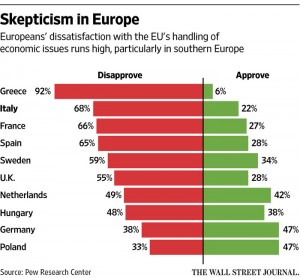Italy: The Next Stop on Populism’s Global March
< < Go Back
Sunday’s national referendum represents a vote of confidence in Matteo Renzi’s government, and a possible opening for the populist 5 Star Movement.
The founder of Italy’s populist 5 Star Movement showed off his growing confidence in a video posted ahead of Sunday’s pivotal national referendum.
“An era is going up in flames,” Beppe Grillo said as Donald Trump’s Election Night acceptance speech played in the background. “It’s the risk-takers, the stubborn, the barbarians who will carry the world forward…We will end up in government, and they will be asking, ‘How did they do it?’ ”
Italian voters will decide Sunday on a constitutional change that would effectively strip the Senate of most of its powers. It is a gamble by Prime Minister Matteo Renzi—for Italy and abroad—and a centerpiece of his efforts to more quickly revamp Italy’s sickly economy.
If he loses, Mr. Renzi, 41 years old, has pledged to resign, making the vote a sign of confidence in his nearly three-year-old government, and a possible test of populism’s reach. Mr. Renzi’s popularity is declining, and recent polls suggest a no vote will prevail, though many voters remain undecided.
Such an outcome would be the latest victory for antiestablishment politicians in a year that saw Brexit and a Trump presidential win, and would give a boost to the 5 Star Movement, which has opposed Mr. Renzi’s proposal as not radical enough. In Europe, as in the U.S., voters are angry at political elites and frustrated by slow growth. Elections are set next year in France, Germany and the Netherlands.
“The referendum is a lightning rod for divisions that are much, much deeper in society,” Economy Minister Pier Carlo Padoan said in an interview.
The economy in Italy, a perpetual worry for European policy makers for its high debt and political instability, has since 2007 endured one recession after another; 97% of households saw real income fall or stay flat in the past decade, consulting group McKinsey said, and the economy is 12% smaller.
At the end of 2015, nearly 60% of jobless Italians had been unemployed for at least a year, compared with 19% in the U.S., according to the Organization for Economic Cooperation and Development. One million Italian jobs disappeared in the years after the financial crisis.
Such deep economic malaise has fueled the 5 Star Movement, which was founded in 2009 by Mr. Grillo, a well-known comic who had long included biting social commentary in his routines. The party began as a “cyber utopia” movement that placed deep faith in the power of direct democracy—choosing electoral candidates and platforms through online balloting.
Its popularity was ignited by demands for honesty among officeholders, as well as the group’s harsh criticism of Italy’s establishment parties.
Mr. Grillo contends Mr. Renzi’s constitutional reform falls short of the root-and-branch changes needed. “Amateurs are welcomed if professional politicians have brought the world to what it is now,” he said.
Mr. Grillo has his eye on the office of premier. Luigi Di Maio, age 30, the 5 Star parliamentarian who is deputy chairman of Italy’s lower house, is viewed as a possible candidate to lead a government headed by his group.
Markets have been unnerved at the prospect of a no vote.
More From The Wall Street Journal (subscription required):






